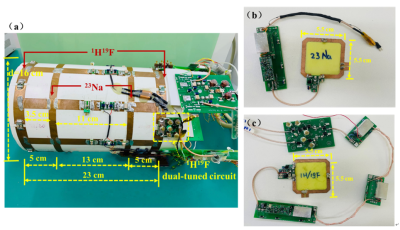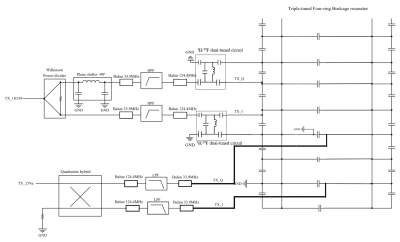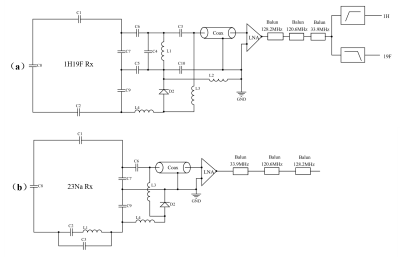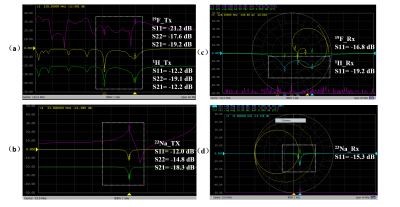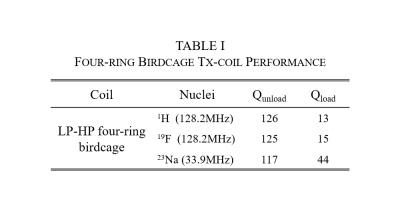3231
Triple-nuclear RF coil system for Simultaneous acquisition of 1H / 19F / 23Na MR imaging at 3T1Lauterbur Imaging Research Center, Shenzhen Institutes of Advanced Technology, Chinese Academy of Sciences, Shenzhen, China, 2Key Laboratory for Magnetic Resonance and Multimodality Imaging of Guangdong Province, Shenzhen, China, 3Department of Biomedical Engineering, State University of New York, Buffalo, NY, United States
Synopsis
The lower natural abundance and gyromagnetic ratios of non-hydrogen nuclei require the use of a highly efficient RF coil to optimize the quality of the image. In this study, a novel triple-nuclear RF coil system capable of 1H / 19F / 23Na imaging was designed. The coil consists of a triple-tuned four-ring birdcage transmit coil and the tight fit local X-nuclei single-loop receive coils. A range of bench tests were performed by using the developed triple-nuclear coil. The performance evaluations showed that the coil system was appropriately tuned, matched and decoupled at 1H/19F/23NA frequencies when working simultaneously.
Introduction
Affected by the lower concentration and the lower MR sensitivity compared to that of the proton, imaging X-nuclei is challenging. Significant SNR enhancement in X-nuclei magnetic resonance imaging can be obtained with the optimal RF coil sensitivity [1-2]. The coil should provide homogenous B1 fields at the resonance frequencies of both (1H) and non-proton nucleus, and preferably acquired MRI imaging of multiple nucleus simultaneously, for the most accurate localization, shimming and measurement of metabolite concentration [3-4].A four-frequency 1H / 19F / 23Na/ 31P RF transceiver was developed in our previous study [5]. Moreover, the efficient method to have a homogeneous excitation and highly sensitive reception is to use a volumetric coil for transmission (Tx) and receiver (Rx) coils for signal reception [6]. In this study, a novel integrated triple-nuclear RF coil system which consists of a triple-tuned modified four-ring birdcage TX-coil and the tightly fit local multiple nuclear single-loop (Rx) coils was designed for 1H / 19F / 23Na MR imaging at 3T. The feasibility and performance of the coil were evaluated on the bench. Good tuning, matching and decoupling performance was obtained from the bench tests. The results indicate that it is possible to obtain the 1H/19F/23NA MR images by using the proposed integrated coil system.
Method
The novel integrated triple-nuclear RF coil system consist of a four-ring birdcage TX-coil and the tight fit local RX coils was designed and shown in Fig.1. The four-ring quadrature birdcage TX-coil constructed with a triple-tuned configuration (Fig1a). The configuration was consisted of three connected mutually coupled birdcages with 8 legs. The inner structure of the TX-coil configuration uses a low-pass birdcage with adjusted the values of capacitors located on the inner legs for generation of the 23Na (33.9MHz) mode corresponding to the respective Larmor frequencies at 3T. For the outer high-pass configuration that added at each end of the inner birdcage, the 1H19F double-tuned circuit were added on the excited ports of the outer end-rings for generation of the 1H19F (120.6/128.2 MHz) frequency. The high-pass and the low pass configuration of the triple-tuned coil can be driven in quadrature mode at 3T. There was some space at the back end of the coil to accommodate RF circuitry chain.The outside of the plastic cylinder on which the adhesive copper tape is attached. The coils are constructed with size 16 cm in diameter. The copper strips width of the inner rings and end ring width were 1 cm, and 1.5 cm, respectively. The outer ring spacing was chosen as 23 cm, the inner rings were 13 cm apart corresponding to the optimal length. The coil was shielded with copper foils placed 3 cm away from the surface of the coil. The local multiple nuclei single-loop (Rx) coils were with 5.5 cm in diameter as shown in Fig1. (b) and (c).
The RF circuit diagram of the triple-tuned birdcage TX coil was shown in Fig. 2. To drive the triple-tuned birdcage coil in quadrature mode, outputs of equal amplitude with relative phase offsets of 90 were generated using a quadrature hybrid for 23Na mode, and using a wide-band power-divider combined with phase shifter for IH19F mode. Both 1H19F and 23Na cable traps were inserted. Further, low-pass filter was applied to the inner 23Na low-pass birdcage coil, and high-pass filter on the outer 1H19F coils, to minimize coupling noise from adjacent coils. The circuit diagram of the local Rx coils were depicted as shown in Fig. 3. The phantom (15 cm in diameter) was filled with 2.6 g/L NaCl and 1.234 g/L NiSO4. 6H2O was used as the load. The quality factors (Qunload, Qload) of the coils was measured on the bench using the network analyzer. S-parameters under loaded conditions were measured In order to evaluate the match and the isolation of the channels in different nucleus.
Results
There are three resonance frequencies that will produce a homogeneous B1+ field of the coil and can be used for 1H19F/Na NMR. The triple-tuned four-ring birdcage TX coil and the local RX coil were tuned and matched well to the resonance frequencies of 1H/19F/23NA, the detailed measurement values were shown in Fig.4, as return losses of each channel of the TX and Rx coil were less than -12 dB. The isolation between two ports were better than -12dB for 1H, -19dB for 19F and -18dB for 23Na. The unload and load Q factors in the bench-tests were shown in Table.1.Discussion/conclusion
The novel triple -nuclear RF coils system consisting of a triple-tuned modified four-ring birdcage TX-coil and the tightly fit local 1H/19F/23Na nuclei single-loop Rx coils was built for 3T MRI in this study. The configuration was used for the involving excitation and acquisition of 1H/19F/23Na signals. The performance evaluations through the bench tests showed that the coil system was sufficiently matched and decoupled. In the future work, the imaging performance of the coil will be evaluated on system. Furthermore, more legs or struts in the coil will be used and ring spacing will be optimized to provide better RF field homogeneity and efficacy.Acknowledgements
This work was supported in part NSFC under Grant No. 81627901; National Key R&D Program of China, 2021YFE0204400; the Strategic Priority Research Program of Chinese Academy of Sciences (Grant No. XDB25000000); city grant RCYX20200714114735123.References
[1] Ha Y.H, Choi. C. H, Shah N.J, et al. Development and Implementation of a PIN-Diode Controlled, Quadrature-Enhanced, Double-Tuned RF Coil for Sodium MRI. IEEE Trans. Med. Imaging. 2018; 37(7): 1626–1631.
[2] S. M. Hong, C.H.Choi, et al. Design of a quadrature 1H/31P coil using bent dipole antenna and 4-channel loop at 3T MRI. IEEE Trans. Med. Imag., 2018; 37(12): 2613–2618.
[3] Murphyboesch, J, R. Srinivasan, et al. Two configurations of the Four-ring birdcage coil for 1H imaging and H-decoupled P spectroscopy of the human head. J. Magn. Reson.1994;103(2):103-114.
[4] Y. Duan, B.S. Peterson, et al. Computational and Experimental Optimization of a Double-Tuned 1H/31P Four-Ring Birdcage Head Coil for MRS at 3T. J. Magn. Reson. Imaging. 2009; 29: 13-22.
[5] N. Li, X. Yang, F. Du, et al. Simultaneous acquisition of 1H/ 19F/ 23Na/ 31P MR imaging in Phantom at 3T using a quadruple-nuclear RF coil system. ISMRM. 2021; 1790.
[6] Matthias M , Ruomin H , C. C. Jorge, et al. Reducing signal-to-noise ratio degradation due to coil coupling in a receiver array for 35Cl MRI at 9.4 Tesla: A comparison of matching and decoupling strategies. Concepts. Magn. Reson. Part B. 2018; 48B: e21383.
Figures
